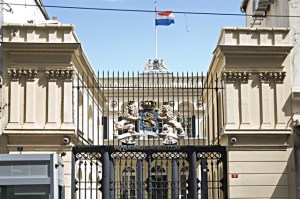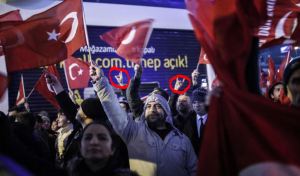nsnbc : The Dutch Foreign Ministry on February 5, 2018, said it had formally withdrawn its ambassador to Turkey, who has been physically barred from the country for almost a year, after The Netherlands deported Turkey’s Social and Family Affairs Minister in March 2017.
 The Netherlands and Turkey have suspended negotiations for the normalization of bilateral relations, with the former officially announcing the withdrawal of its ambassador to Turkey. The Ambassador has already been absent for more than 10 months since tension erupted between the two countries last year.
The Netherlands and Turkey have suspended negotiations for the normalization of bilateral relations, with the former officially announcing the withdrawal of its ambassador to Turkey. The Ambassador has already been absent for more than 10 months since tension erupted between the two countries last year.
The Dutch government also announced that it will not allow the Turkish ambassador to return to his office in The Hague. The move came after the failure of talks between the two sides, with the Netherlands reportedly refusing Turkey’s demand that it issue an apology to Family and Social Policy Minister Fatma Betül Sayan Kaya for not allowing her to enter the Turkish consulate and extracting her after a police intervention last year.
In March 2017 Turkey’s Prime Minister Binali Yilirim vowed that the Netherlands’ deportation of Turkey’s Family and Social Affairs Minister is unacceptable and will be responded to in the harshest way. The Turkish AKP government invoked the Vienna Convention, an invocation with questionable validity.
Yildirim, in 2017, said “Whatever the reason for this (decision to deport the minister) it is, it is unacceptable and will be responded in kind”. Yildirim slammed that the Netherlands violated diplomatic protocols with the decision.
The Turkish AKP government invoked the Vienna Convention that regulates diplomatic immunity and privileges which it believes have been violated by the Netherlands’ decision to deport the minister. However, other would stress that the Vienne Convention does not cover the use of diplomatic privileges to promote “party politics” under the guise of “diplomacy”.
However, the visit of Turkey’s Social Affairs Minister Fatma Betul Sayan Kaya aimed at promoting the ruling AKP’s position with regard to the upcoming referendum on the introduction of an executive presidential system in Turkey and other constitutional change. As such, one may argue that Kaya fulfilled a “party” function and not the function of a minister or diplomat.
Yildirim then also urged Turkish nationals in the country who went to the streets to protest “the scandal” to remain calm and return to their homes. Meanwhile, protesters surrounded the Dutch Consulate in Turkey, took down the Dutch flag and substituted it with a Turkish flag – without encountering the level of police brutality one is used to see in Turkey when it comes to anti-AKP government protests.
It is also noteworthy that a close study of photographic and video material from Turkey revealed a large presence of Turkish protesters with links to the Gray Wolves in both the Netherlands and Turkey.

People holding a rally in front of the Dutch Consulate in Istanbul, Turkey, on March 12, 2017 – Note the Gray Wolves’ hand sign (red circles)
The scandal broke after the Dutch police blocked the Family and Social Affairs Minister Fatma Betul Sayan Kaya’s convoy from entering the Turkish consulate in Rotterdam. Early on Sunday, Dutch police escorted Kaya back to Germany after hours of standoff between both sides. Kaya was scheduled to meet Turkish society in Rotterdam ahead of April 16 constitutional referendum in Turkey on constitutional reform. Note that the “Turkish Society” is also known for having a relatively large presence of persons with ties to the Gray Wolves.
Turkish Foreign Minister Mevlut Cavusoglu – in 2017 – said that Ankara would respond ten times stronger to the Dutch government’s decision to prevent Turkish minister from entering the country. Considering the “Gray Wolves” and Turkey’s systematic intimidation of Turks of Kurdish origin abroad, intimidation of non-AKP-government compliant journalists abroad, and more, there are many who interpret Foreign Minister Cavusoglu’s statement as a thinly veiled threat about the prospect of covertly state-sponsored terrorism or violence.
The Dutch government argued in 2017 and still argues that Kaya did not have a diplomatic immunity and is not subject to diplomatic conventions. A Dutch Foreign Ministry statement announced the decision to withdraw its ambassador to Turkey on February 5, 2018.
“The Netherlands and Turkey have recently held talks at various levels. At this stage, these talks do not yet offer a perspective to normalizing the bilateral relations. Minister Zijlstra: ‘Recent talks offered Turkey and the Netherlands an opportunity to come closer to each other, but we have not been able to agree on the way normalization should take place,” read the statement, quoting Dutch Foreign Minister Halbe Zijlstra.
“Therefore the Dutch government has decided to officially withdraw the Netherlands’ Ambassador in Ankara, who has not had access to Turkey since March 2017. As long as the Netherlands has no Ambassador to Turkey, the Netherlands will also not issue permission for a new Turkish ambassador to take up duties in the Netherlands. This message has just been conveyed to the Turkish chargé d’affaires in The Hague. This has brought a pause in the talks with Turkey,” said the statement.
A Dutch diplomat told the Hürriyet Daily News in Ankara that the two parties “could not find the mutual concession balance in the negotiations,” expressing disappointment at the development, which goes against the two countries’ “400-year history of friendship.” He also underlined that the Dutch government’s decision to withdraw the ambassador from Turkey was about the ability to reassigning him to a new post, as he has not been able to return to his duties in Ankara.
“For more than 10 months, one of our most senior diplomats has not been able to come to the country where he is serving. This decision is related to the appointment of our valuable member elsewhere,” the Dutch diplomat said.
CH/L – nsnbc 06.02.2018
Source Article from https://nsnbc.me/2018/02/06/87689/
 RSS Feed
RSS Feed















 February 7th, 2018
February 7th, 2018  Awake Goy
Awake Goy 










 Posted in
Posted in  Tags:
Tags: 













